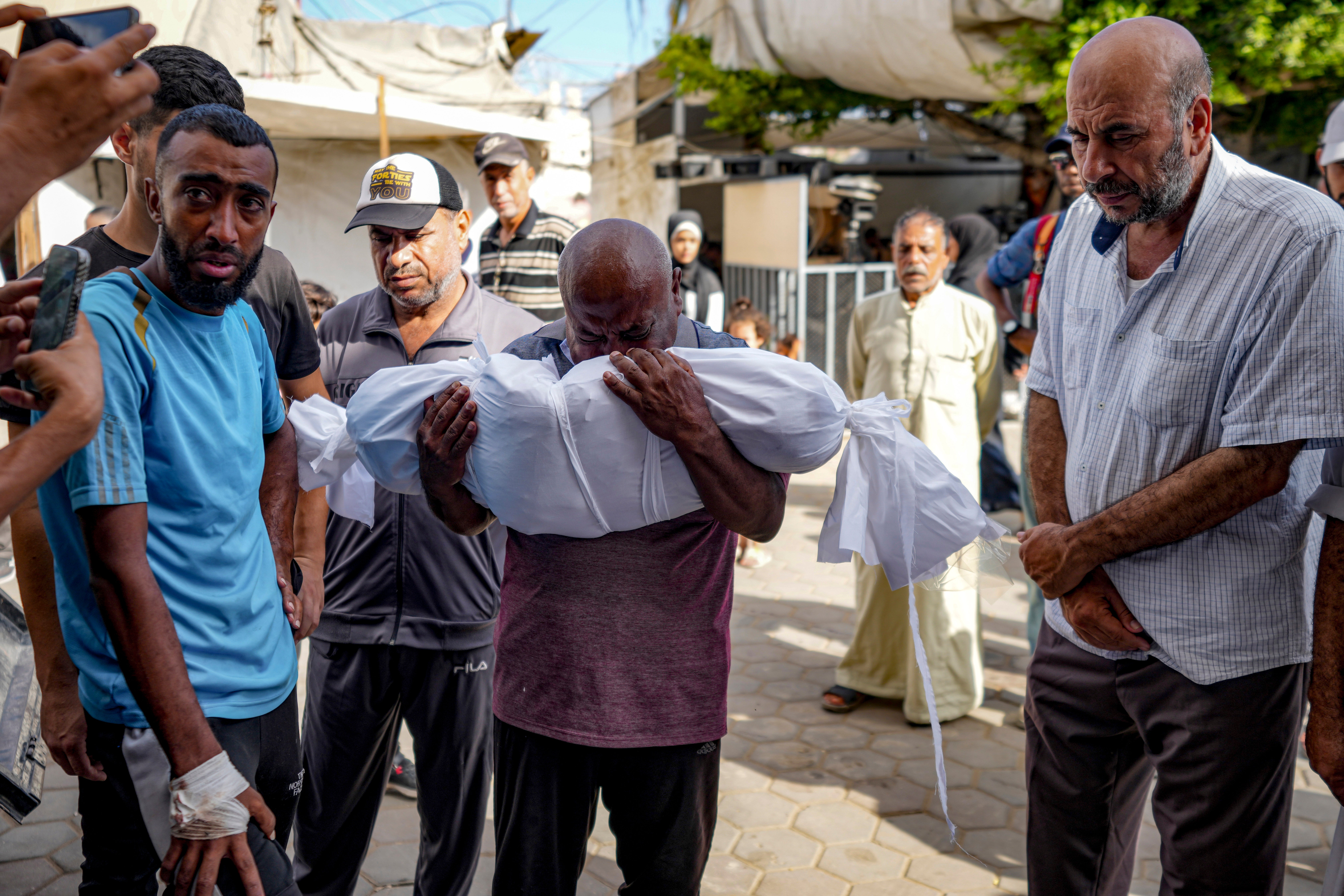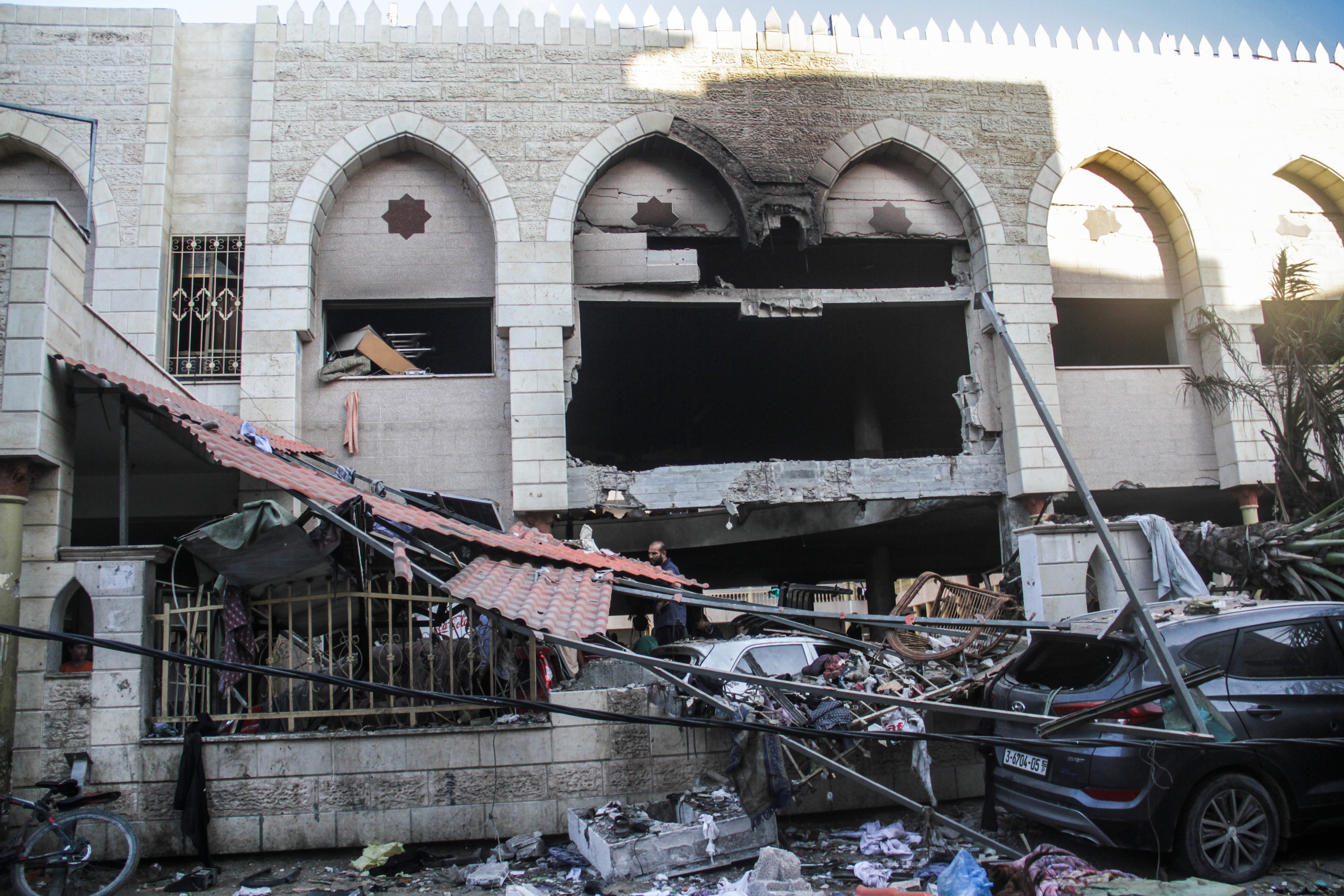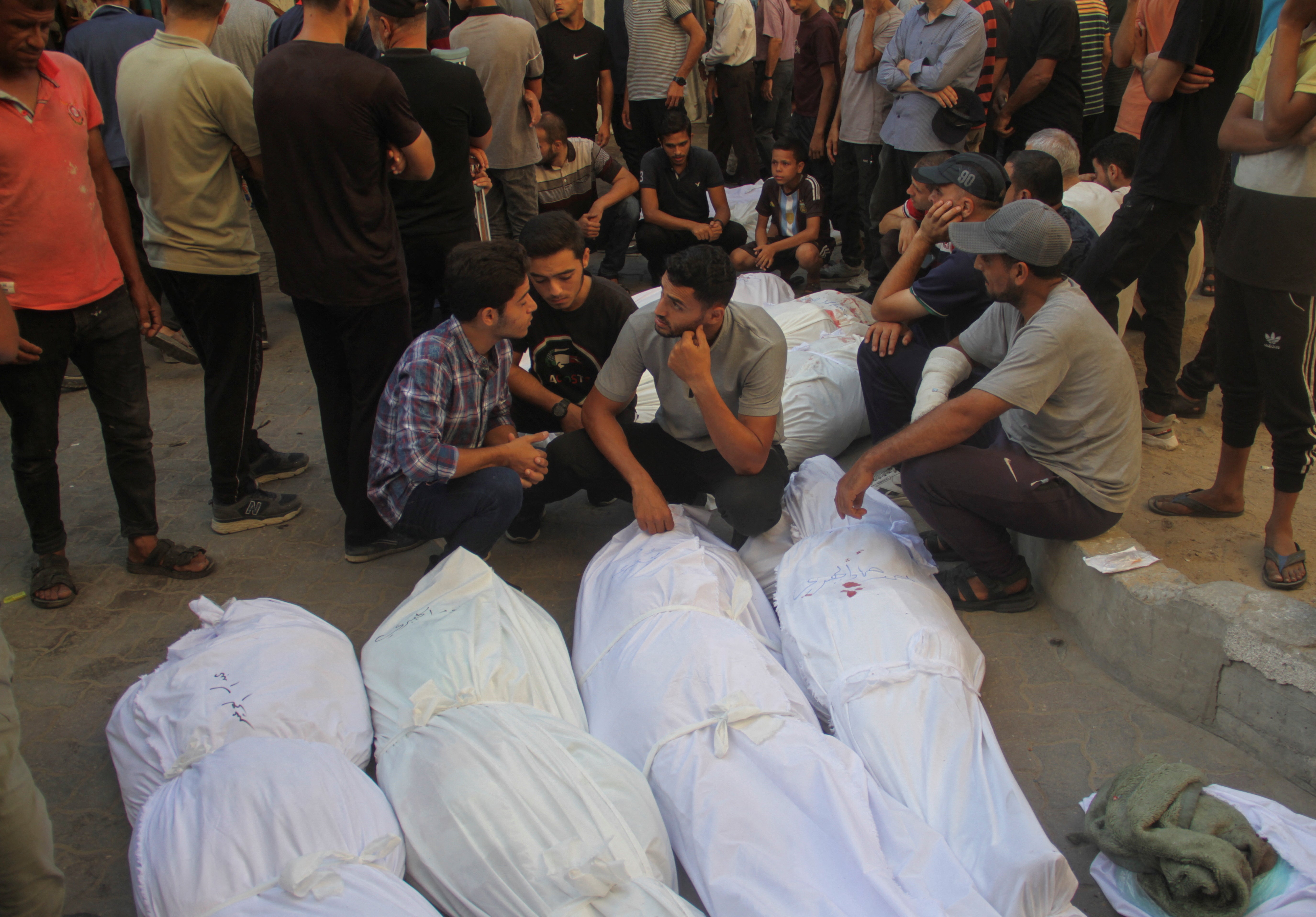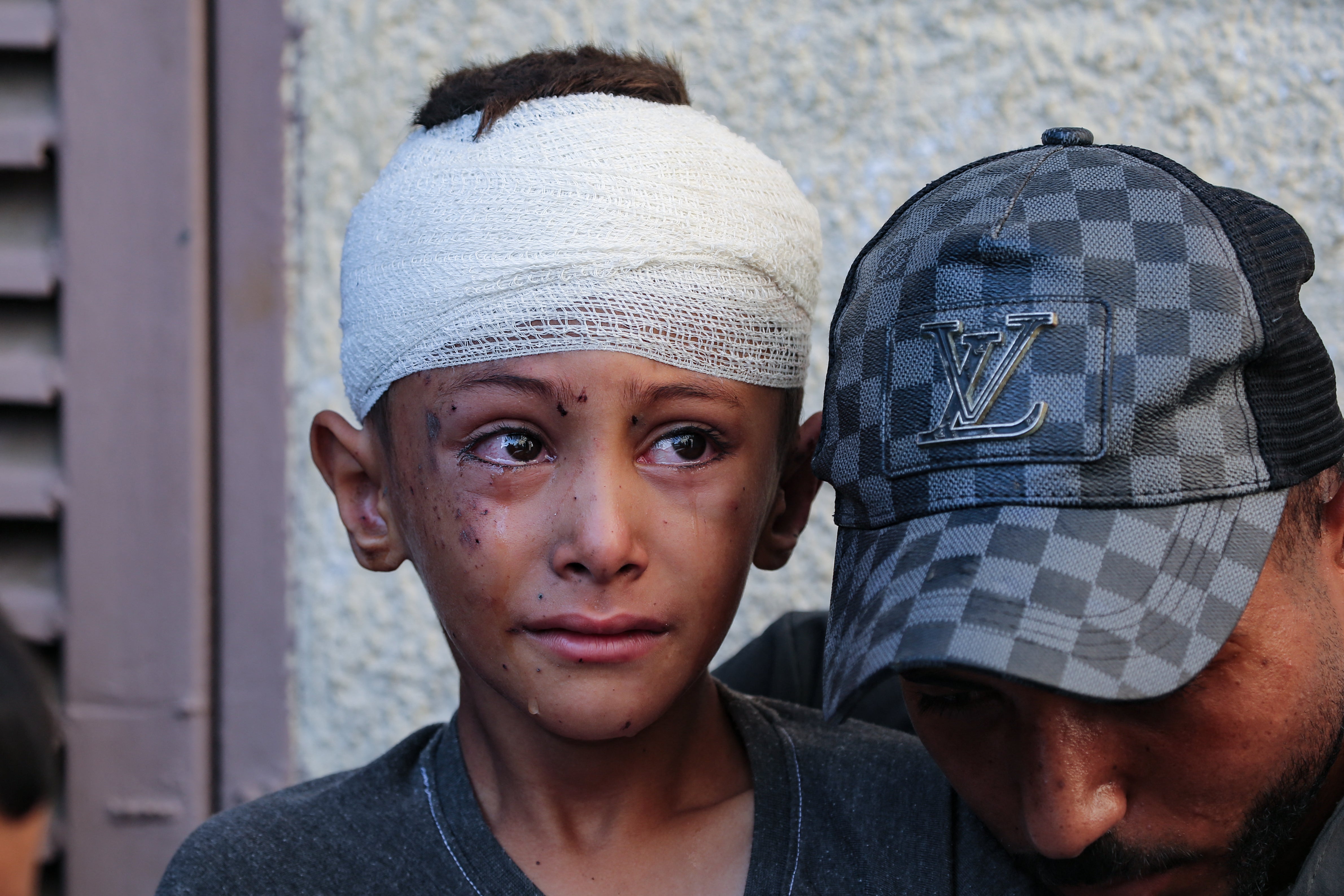Terror and death as Israel strikes school in Gaza during prayers
Palestinians describe the harrowing moment IDF targeted al-Tabaeen school in Gaza City, killing 100 people

At just past 4am on Saturday, Palestinian families displaced from other parts of Gaza, gathered for Fajr prayers at dawn inside al-Tabaeen school that had turned into a makeshift shelter in Gaza City.
The multi-storey compound – which houses a mosque on the lower floor – had become home for around 4000 people, according to local authorities.
Just before prayers were about to begin, the Israeli missiles tore through the congregation leaving bodies of worshipers “cut to pieces”, witnesses told The Independent.
Osama Al-Kahlout, 28, who was displaced from Gaza City and was living in the school with his family, said his father – a 63-year-old Arabic language university lecturer – was among the people killed in the bombing. Mr Kahlout said his father prayed at dawn every day and that his body was found in a bloodbath under the rubble.

“We could not find my father’s head. We could only identify him from his hands, with a certain mark,” his distraught son told The Independent. “The ground was full of blood and bodies. Wherever you walked, you found blood.”
Ibrahim al-Masry, who was also sheltering in the school after being displaced from Beit Hanoun, said he only survived as he was running late, and so was standing on the upper floor of the building when the bombing began. He says it took him 15 minutes to get down to the site of the strike, as the fire raging was so huge.
He said: “The injuries were horrifying: amputated hands and legs. I saw two wounded people engulfed in flames running out of the mosque and screaming ‘help up, help us’.”
The powerful missiles were described as emanating a heat so intense one doctor treating the wounded at al-Ahli hospital said in a voice note “the bodies were shattered, burned, roasted actually”.

The Palestinian civil defence in Gaza told The Independent that at least three missiles hit al-Tabaeen school and mosque.
Palestinian medics treating the wounded said they counted at least 80 dead, including women, children and the elderly. The Hamas-run health ministry said the total death toll was more than 100.
The Israeli military acknowledged the strike, but cast doubt on the Palestinian death toll saying “three precise munitions” had been used.
In a statement the Israeli military claimed Hamas and Islamic Jihad had embedded a command centre within the school and mosque, and that the strike had eliminated 19 Hamas and Islamic Jihad militants who were operating there. Prior to the strike they said the military had taken “numerous steps... to mitigate the risk of harming civilians”.
I hope this massacre will be the last massacre and the whole world will wake up
Hamas denied having a base at the school and civilians living in the compound said they were sheltering there because they had fled their homes.
The strike, which came just days ahead of renewed US and Qatar-backed ceasefire talks, was widely condemned, with the White House saying it was “deeply concerned” about the bombings, adding “far too many civilians continue to be killed and wounded in the Gaza war”.
Foreign secretary David Lammy said he was “appalled” by the strike and “the tragic loss of life”.
“We need an immediate ceasefire to protect civilians, free all hostages, and end restrictions on aid,” he said on X, formerly Twitter. “Hamas must stop endangering civilians. Israel must comply with International Humanitarian Law,” he added.
The EU’s foreign policy chief Josef Borrell Fontelless said there was “no justification for these massacres” adding that at least 10 schools had been hit by Israeli strikes over the last few weeks. Egypt, Jordan, Turkey and Saudi Arabia also condemned the killings.
Israel imposed a crippling siege and unleashed an unprecedented bombardment of Gaza in retaliation for Hamas militant’s bloody 7 October attack on southern Israel where more than 1000 people were killed and 250 taken hostage.
Since then Israeli strikes have killed more than 40,000 people, the vast majority women and children according to the Palestinian health authorities.

The UN human rights office said that since October there had been “systematic attacks on schools” by Israel, with at least 21 since 4 July, leaving hundreds dead, including women and children. “For many, schools are the last resort to find some shelter and possible access to food and water,” it added.
Juliette Touma, director of communications at the UN’s Palestinian refugee agency UNRWA, said that while al-Tabaeen was not a UN school, Unrwa have recorded that attacks on its school-shelters have killed more than 570 people, and injured more than 1,700 since October.
She called on all parties in the conflict to remember that civilian infrastructure is “protected at all times”.
There has been a flurry of diplomacy in recent days after the assassination of Hamas’ political leader, Ismail Haniyeh, prompted fears of a wider regional war.
There were hopes of a breakthrough in deadlocked peace talks with world leaders uniting in calls for a meeting either in Qatar or Egypt for Thursday.

US president Joe Biden, Egyptian president Abdel Fattah el-Sisi and Qatari Emir Sheikh Tamim bin Hamad Al Thani personally signed the statement backing the 15 August talks.
But there are concerns that this will be scuppered by the bloody attack. At al-Ahli hospital which treated the wounded from the bombing, the hospital director Dr Fadel Naim told The Independent they were struggling to treat dozens of injuries as they lacked even basic medical supplies for burns, including gauze, sterilisation equipment and dressings.
Medics were able to identify at least 70 bodies sent to them but Dr Naim said between five and 10 body parts were so mutilated and in pieces that were “completely unidentifiable”. Dr Khamis Elessi, a neuro-rehabilitation consultant at al-Ahli said: “I hope this massacre will be the last massacre and the whole world will wake up.”
“This savagery will serve as an urgent call for every person with a conscience to wake up to act and act swiftly to stop this war against civilians,” he added.
Subscribe to Independent Premium to bookmark this article
Want to bookmark your favourite articles and stories to read or reference later? Start your Independent Premium subscription today.




Join our commenting forum
Join thought-provoking conversations, follow other Independent readers and see their replies
Comments